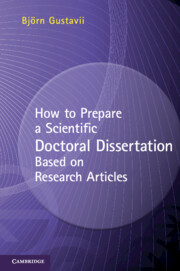Book contents
- Frontmatter
- Contents
- Preface
- Acknowledgments
- 1 Introduction
- 2 Compilation – the article-based thesis
- 3 Front cover illustration
- 4 Title
- 5 Abstract
- 6 Quotations
- 7 Thesis at a glance
- 8 Abbreviations
- 9 List of publications
- 10 Contributors
- 11 Popularized summary
- 12 Acknowledgments
- 13 General introduction
- 14 Aims
- 15 Methods
- 16 Results
- 17 General discussion
- 18 Copyright
- 19 A dissertation worth considering
- Appendix A To the authorities at the graduate division
- Literature cited
- Index
5 - Abstract
Published online by Cambridge University Press: 05 November 2012
- Frontmatter
- Contents
- Preface
- Acknowledgments
- 1 Introduction
- 2 Compilation – the article-based thesis
- 3 Front cover illustration
- 4 Title
- 5 Abstract
- 6 Quotations
- 7 Thesis at a glance
- 8 Abbreviations
- 9 List of publications
- 10 Contributors
- 11 Popularized summary
- 12 Acknowledgments
- 13 General introduction
- 14 Aims
- 15 Methods
- 16 Results
- 17 General discussion
- 18 Copyright
- 19 A dissertation worth considering
- Appendix A To the authorities at the graduate division
- Literature cited
- Index
Summary
By writing a working abstract at an early stage, you will provide yourself with a framework for the rest of the overview. This will guide you in deciding what to include and what to omit. Then, when you have completed the overview, you can return to the working abstract and recast it in its final form.
Unfortunately, there are those who write the abstract as their final effort, often in a hurry and without opportunity for reflection and revision. A tip: If you are pressed for time, and only then, you can use what you have already written. Take a red pencil and a ruler and underline relevant portions in the various sections; then, combine the underlined sentences into an abstract. The advantage of doing this is that you repeat what you have said previously, without having to use synonyms that can alter your original intention. Some people say that doing so is self-plagiarism. However, the sources from which you are repeating yourself are the very same research papers you are going to include in your bound thesis. These phrases have been formulated as precisely and clearly as you were able, so why should they be changed? Actually, there are journals that require you to compile your abstract in this manner. They have a point.
Information
- Type
- Chapter
- Information
- Publisher: Cambridge University PressPrint publication year: 2012
